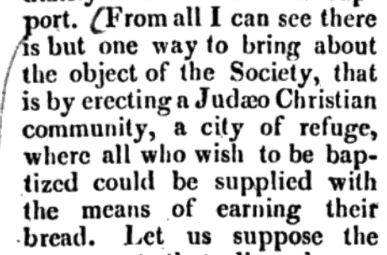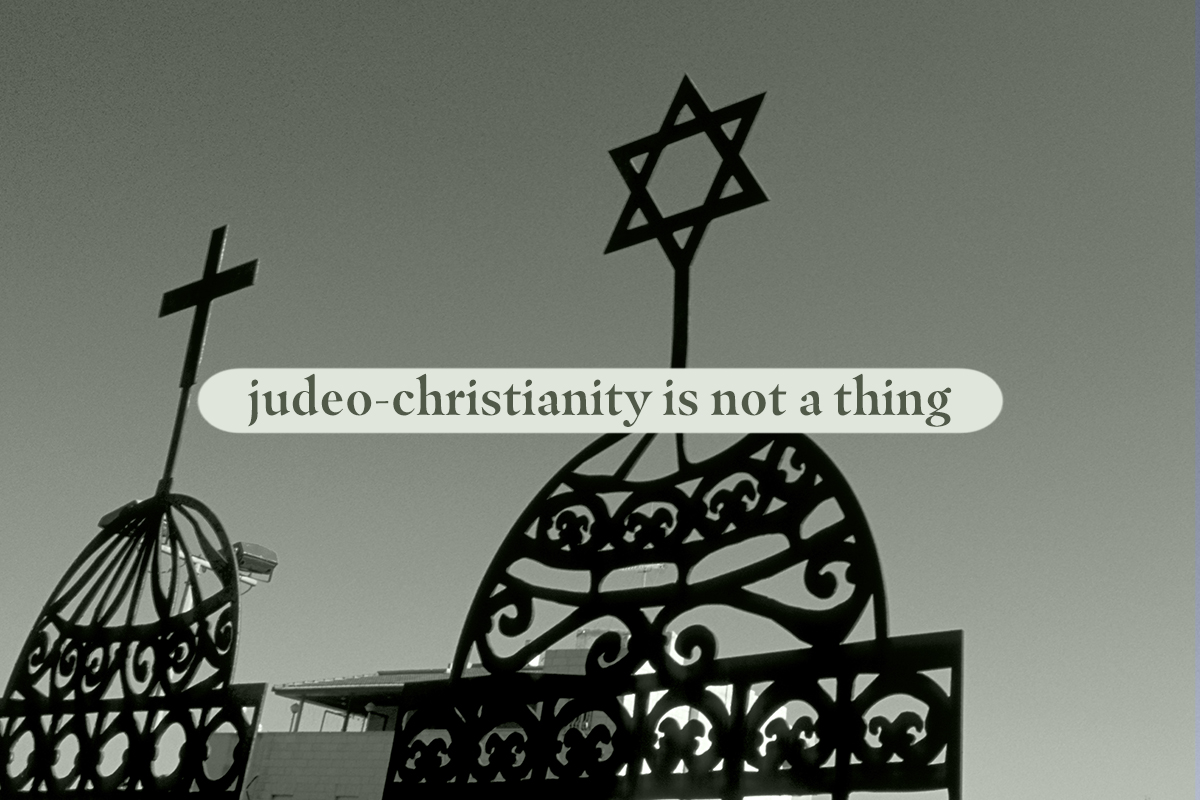The idea of Judeo-Christianity, and “Judeo-Christian values,” is a relatively new one, borne out of World War II and the Cold War. It is a term that has been adapted by many Christians and American political leaders in an attempt to talk about the “shared values” between the Jewish and Christian religions — but in reality, it erases Jewishness and excludes people of other faith backgrounds, particularly Muslims.
Why are we talking about it now?
On November 29, Dr. David Samadi, a contributor to the conservative Newsmax network, tweeted, “Our churches must reopen. We need to pray at this time of the year. It is the holiest time in the Judeo-Christian calendar. If we can have Walmart, Cotsco, liquor stores, strip clubs and supermarkets we can have churches.”
Quickly, many pointed out that the “Judeo-Christian calendar” is absolutely not a thing. Hanukkah, which is what we can assume he was referring to, is not the holiest time of the year for Jews — that’s reserved for a period called the “High Holidays” (also called the “High Holy Days,” the 10 days spanning Rosh Hashanah and Yom Kippur). Also, Jews notably use a lunar calendar rather than the Gregorian solar one; it’s kind of our whole deal.
Soon, many began to point out not only is the term “Judeo-Christian” inaccurate, but has antisemitic roots, as well. Let’s get into it, shall we?
Where did the term Judeo-Christian come from?
Before the 20th century, there was no conception of Judeo-Christianity, especially in the United States. In the 1930s, it became a political term. We’ll get to that in a second, but first it’s important to note that the term Judæo Christian actually first referred to Jewish converts to Christianity.
It was first used in a letter from Reverend Alexander McCaul, a guy who is known for being a missionary to the Jews. (Aiming to specifically convert Jews: antisemitic!) Here’s what he writes:

“From all I can see there is but one way to bring about the object of the Society, that is by erecting a Judæo Christian community, a city of refuge, where all who wish to be baptized could be supplied with the means of earning their bread.”
Baptizing Jews, oof.
But that is not how the term is really understood today, so let’s move on…
How did Judeo-Christian emerge as a political term in the United States?
It all started in the 1930s with the rise of Hitler in Germany. As historian James Loeffler notes in The Atlantic, “A European émigré, the German liberal theologian Paul Tillich, was among the first to use the phrase, warning in 1933 that the ‘Protestant church in Germany has on the whole fallen under the spell of Hitlerism … [the] Jewish-Christian tradition [must fight] totalitarianism.'”
After the United States entered World War II in 1941, the phrase “Judeo-Christian” really took off. And Judeo-Christianity, the idea that Jewish and Christian traditions hold sacred similar values and traditions, came to define America itself and its global responsibility. Historian Jonathan Sarna writes in American Judaism: A History that interfaith groups popularized the term to define America in “more inclusive religious terms” so as to combat antisemitism and anti-Catholicism. The term was meant to include America’s “three faiths”: Protestantism, Catholicism, and Judaism, and became a way to signal a fight against fascism.
But when the phrase really took off was after World War II, in the context of the Cold War. The Cold War, for those who are unfamiliar, was the period of tension/rivalry/sometimes actual war between the U.S. and its allies and the Soviet Union from around 1947 to 1991. The U.S. viewed it as a fight between democracy and communism.
Alright, tell me about “Judeo-Christianity” and the Cold War.
In the context of the Cold War, American leaders used the concept of a shared religious heritage to define America’s role in the world.
For President Harry Truman and other American leaders, the Cold War became a fight between freedom of faith and democracy versus “Godless” communism. Truman, then, recognized that appealing to vague religious values would unite America against its Cold War enemies, because, as he said in his 1948 State of the Union Address, “We are a people of faith.” (Notably, when Truman talked about “faith”, it didn’t exactly include Muslims, Hindus, Buddhists, Sikhs, Native Americans, or the many other religious/faith groups that made up — and still make up! — the United States.)
Under the presidency of Dwight D. Eisenhower, the idea of “Judeo-Christianity” became fully enmeshed in American political discourse. Judeo-Christian values, Eisenhower asserted, guided America in its mission to spread liberty, democracy, peace, and tolerance. In Eisenhower’s own words, from 1952: “Our form of government has no sense unless it is founded in a deeply felt religious faith, and I don’t care what it is. With us of course it is the Judeo-Christian concept, but it must be a religion that all men are created equal.”
On the flip side, in a 1954 letter, Eisenhower actually cautioned his brother against the term “Judaic-Christian” heritage: “You speak of the ‘Judaic-Christian heritage.’ I would suggest that you use a term on the order of ‘religious heritage’—this is for the reason that we should find some way of including the vast numbers of people who hold to the Islamic and Buddhist religions when we compare the religious world against the Communist world.”
Yet, he did not do so publicly. American leaders — Truman, Eisenhower, and John F. Kennedy — invoked the idea of Judeo-Christianity during the early Cold War to unify Americans behind the mission of defending freedom and democracy worldwide.
And, fun fact, this directly ties into the history of America’s relationship with Israel, which you can read all about here.
How did the term evolve?
Well, it quickly began to be used by all sides of the political spectrum.
In Letter from a Birmingham Jail, Martin Luther King, Jr. wrote in 1963:
One day the South will know that when these disinherited children of God sat down at lunch counters, they were in reality standing up for what is best in the American dream and for the most sacred values in our Judaeo Christian heritage, thereby bringing our nation back to those great wells of democracy which were dug deep by the founding fathers in their formulation of the Constitution and the Declaration of Independence.
Judeo-Christianity became a shorthand to signal morality, godliness, anti-communism, democracy, and more.
Soon, Judeo-Christianity became a way of Christianity to absorb Judaism in a way, erasing the very real differences that keep the two religions separate.
As Warren Zev Harvey notes in “The Judeo-Christian Tradition’s Five Others,” “The liberal ecumenical campaign on behalf of the term ‘Judeo-Christian tradition’ was successful in the United States beyond all expectations. Indeed, for many Jews, it was too successful. Far too successful! The differences between Judaism and Christianity were being forgotten. Judaism was beginning to be seen as a Christian sect that had one or two idiosyncrasies — like preferring the menorah to the Christmas tree, or the matzah to the Easter egg.”
Say it with us: Not Great. Soon, the very progressives who championed the use of the term a decade earlier as a means for Jewish inclusion in mainstream American culture began to campaign against it.
Notably, Arthur Cohen’s 1969 essay, “The Myth of the Judeo-Christian Tradition,” became a key document in refuting the idea of “Judeo-Christianity.” (You can read his full essay here, in Commentary Magazine.) Cohen writes, simply: “The Judeo-Christian tradition is a construct… What is omitted is the sinew and bone of actuality, for where Jews and Christians divide, divide irreparably, is that for Jews the Messiah is yet to come and for Christians he has already come. That is irreparable.”
But the term had already gained ground.
How is “Judeo-Christian” used in modern times?
After the al-Qaeda terrorist attack on September 11, 2001, “Judeo-Christian” became an Islamophobic dogwhistle.
Let’s run through some examples, shall we?
In 2002, the prominent evangelist Franklin Graham said, “The god of Islam is not the same god of the Christian or the Judeo-Christian faith. It is a different god, and I believe a very evil and a very wicked religion.”
This isn’t true: As one of the Abrahamic religions (which includes Islam, Judaism, and Christianity), the God of Islam, Allah, is indeed the same God that revealed himself to Abraham in the Hebrew Bible.
In 2006, Republican representative Virgil Goode wrote an op-ed in USA Today titled “Save Judeo-Christian values,” decrying Muslim Rep.-elect Keith Ellison’s decision “to use the Quran in connection with his congressional swearing-in.” He writes, “I believe that if we do not stop illegal immigration totally, reduce legal immigration and end diversity visas, we are leaving ourselves vulnerable to infiltration by those who want to mold the United States into the image of their religion, rather than working within the Judeo-Christian principles that have made us a beacon for freedom-loving persons around the world.”
Your Islamophobia is showing, Virgil.
The term is not exclusive to the U.S., nor solely used in an anti-Muslim backlash to 9/11; right-wing British politician Nigel Farage, for example, said in 2015 following the Charlie Hebdo attacks in Paris, “We’re going to have to be a lot braver and a lot more courageous in standing up for our Judeo-Christian culture.”
What about the Trump administration and “Judeo-Christianity”?
“We are stopping cold the attacks on Judeo-Christian values,” President Trump said in October 2017. “We’re saying ‘Merry Christmas’ again.” I don’t have to point out the irony here that Christmas is not a Jewish holiday, do I?
Trump’s chief strategist, Steve Bannon, “has for some time been an evangelist for ‘the Judeo-Christian West,'” an article in the National Catholic Reporter notes. Bannon, remember, co-founded the far-right news platform Breitbart. As Bannon told the Economist in 2017, “I want the world to look back in 100 years and say, their mercantilist, Confucian system lost. The Judeo-Christian liberal West won.”
As Beth Daley wrote in the Conversation at the time of Trump’s 2017 speech, Trump’s “‘Judeo-Christian values’ are about protecting Christmas, and about protecting Christians – at the exclusion of others… It seems, then, that the idea of Judeo-Christian values excludes both Jews and Muslims. The phrase tacitly excludes Jews by subsuming Judaism into Christianity, and it explicitly excludes Muslims in its use in anti-immigration rhetoric.”
Well said.
What about some tweets on the topic?
Well, since you asked…
just a reminder, too, that "Judeo-Christian" isn't a thing and was invented by Christians in cold war time in order to assert Christian hegemony.
— Mx. D. E. Anderson (@diannaeanderson) November 29, 2020
Still mad about “Judeo-Christian calendar.” What year is it on that calendar my dude
— Jess Zimmerman (@j_zimms) November 30, 2020
https://twitter.com/andmichaelgreen/status/1333121266807521281?s=20
Tl;dr?
Judeo-Christian values was a political term invented to unify Americans against “godless” communism during the Cold War, and has more recently been weaponized against both Muslims and Jews. It’s not a real thing. Bye!



